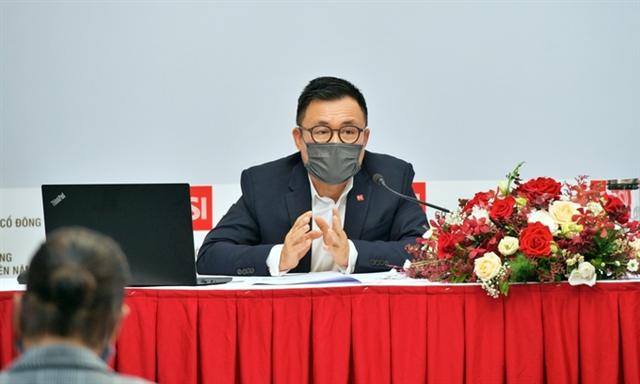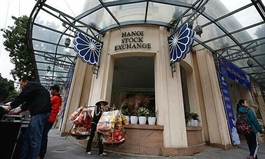Brokerage head denies using social media to influence stock market
Brokerage head denies using social media to influence stock market
Nguyen Duy Hung, chairman of leading brokerage SSI Securities Corporation, has asserted that he does not use social media to influence the stock market.
Nguyen Duy Hung, chairman of leading brokerage SSI Securities Corporation, at the SSI's annual shareholder meeting on May 22, 2021. Photo courtesy of SSI.
|
He said he only uses social media to stay in touch with friends.
Hung is one of the few leaders of large enterprises active on social media. His personal page has nearly 90,000 followers and each of his statuses garners several thousand "likes."
Such a prominent online presence led to him being asked at the the SSI's 2021 online annual meeting Saturday if he used his own statements to influence the market.
Hung said he has made no statement on social media "to fluctuate the stocks."
"I post statuses online to express my thoughts, but I don't actually try to convey any message there. In fact, my exchanges related to the stock market are very few."
The head of SSI also added that his personal social media account is used to communicate with friends and followers on certain issues.
Hung also addressed the question of ethics in business operations after shareholders wanted to know about trading activities of SSI, one of the top brokerages in the country.
"We do not participate in price manipulation, price blowing or taking sides in groups. When SSI divests its investments, it means we have achieved all our goals," he said.
Hung said the stock market was a place that dealt with all kinds of goods and participants. Stocks go up and down as per market forces. Professionals must be honest to ensure market transparency, he said.
He noted that in all countries, if the professional ethical standards are higher than legal standards, market participants will have to follow the former.
"At SSI, we only give out honest statements," he said.
When shareholders asked Hung about stock market prospects for the year, he said this year would be better than last year.
"But the good thing here is not just that the market goes up, but that the number of participants increases with good liquidity. In 2021, there will be more 'deals' to raise capital, better market development opportunities."
He said he doesn't see the possibility of a financial crisis breaking out in the near future.
One positive development is that the amount of money transferred from the savings channel to the stock market is still very large, he said.
With such positive expectations, SSI has set a revenue target of VND5.26 trillion (over $227 million) this year, up 15 percent year-on-year. Pre-tax profit is expected to reach VND1.87 trillion, up 20 percent year-on-year.
The targets are based on calculations made by different SSI divisions. The investment division has assessed that the market would fluctuate below 1,300 points, while another predicts that it could peak above 1,400 points, with a liquidity of over VND16 trillion.
"Until now, everything is still going in the right direction as envisaged by SSI," Hung said.
Commenting on the net selling trend by foreign investors, Hung said investors should not be too concerned about that cash flow at the moment. He said traders have their own criteria, and their decision to join and withdraw from SSI is based solely on their interests.
"When they reach their target, they will withdraw. But when the new fund is established, the money flows back in. People shouldn't be too concerned about this," Hung said.
On losing the leading brokerage position by market share to VPS Securities, a position that SSI has held for many years on the HCM Stock Exchange (HoSE), Hung said competition was necessary for development of the market.
The brokerage plans to increase its capital to VND11 trillion through the distribution of bonus shares, equity issuance to existing shareholders and private placements.



























